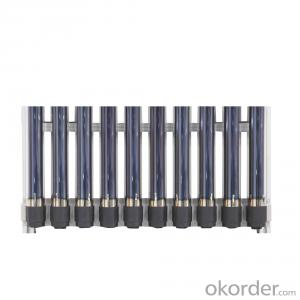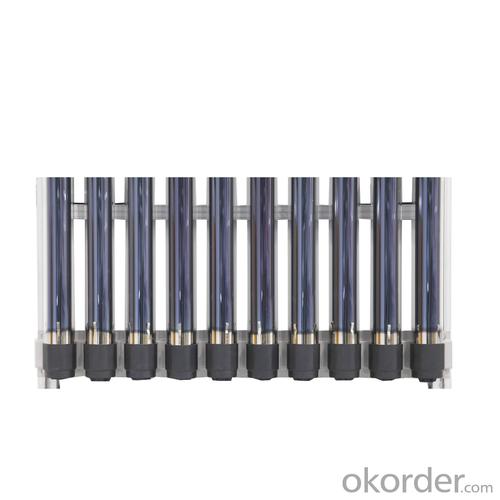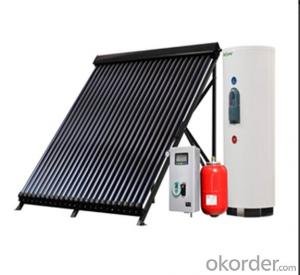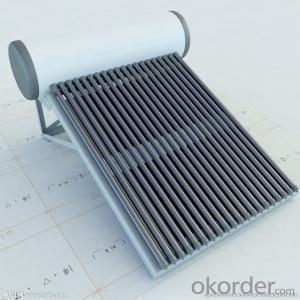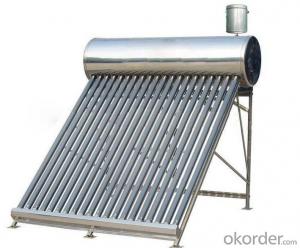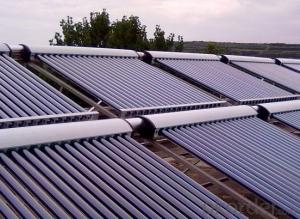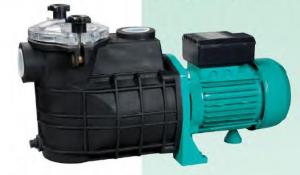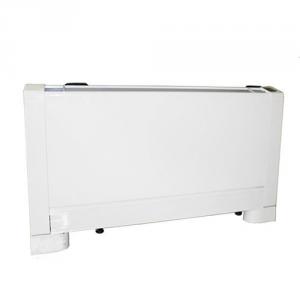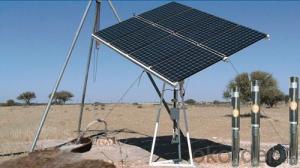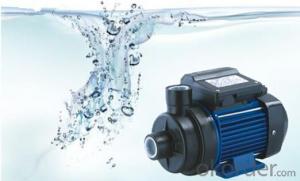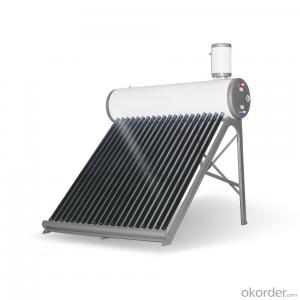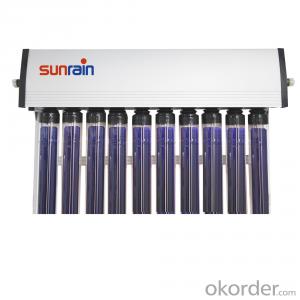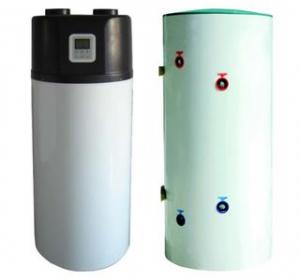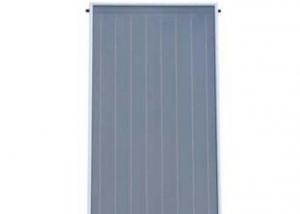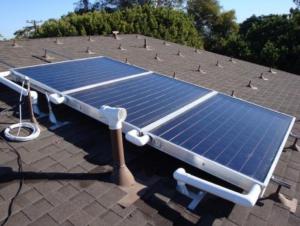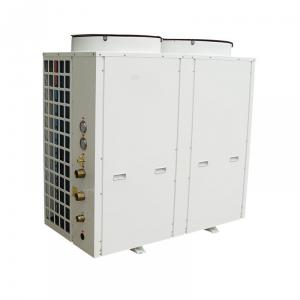Pex Solar Water Heater Swimming Pool Heat Pump
- Loading Port:
- China Main Port
- Payment Terms:
- TT OR LC
- Min Order Qty:
- -
- Supply Capability:
- -
OKorder Service Pledge
Quality Product, Order Online Tracking, Timely Delivery
OKorder Financial Service
Credit Rating, Credit Services, Credit Purchasing
You Might Also Like
| Type | Swimming/Circulation Heating |
| Heating capacity | 3.5kw~39kw |
| COP | ≥4.5 |
| Rated water temp. | 30℃ |
| Running ambient temp. | -7~43℃ |
| Compressor | Scroll/Rotary |
| Refrigerant | R410a |
| Power supply | "220-240~/50/1 380-415~/50/3 " |
| Certification | CE |
Features
Titanium tube heat exchanger.
Evaporator is larger than usual size to keep its high efficiency.
Refrigerant R410A.
Full automatically start up and stop with setup temperature.
Small space and easy install&maintain.
- Q: How does the type of circulation system impact the performance of a solar water heater?
- The type of circulation system in a solar water heater can have a significant impact on its performance. A well-designed circulation system ensures efficient heat transfer and distribution, resulting in improved overall performance of the solar water heater. Different circulation systems, such as passive thermosiphon or active pumps, can affect the flow rate, temperature stratification, and heat loss within the system. By selecting the appropriate circulation system, the efficiency and effectiveness of the solar water heater can be optimized, leading to greater energy savings and better hot water supply.
- Q: Can a solar water heater be used in areas with frequent thunderstorms?
- Yes, a solar water heater can still be used in areas with frequent thunderstorms. Thunderstorms do not directly affect the functionality of a solar water heater. However, during cloudy or rainy days, the efficiency of the solar water heater may be reduced as there is less sunlight available to heat the water. Nonetheless, the system can still operate and provide hot water, although the water may take longer to reach the desired temperature.
- Q: Are there any tax credits available for installing a solar water heater?
- Yes, there are tax credits available for installing a solar water heater. The Federal Investment Tax Credit (ITC) allows homeowners to claim a credit of 26% of the installation cost on their federal taxes. State and local incentives may also be available, making it a cost-effective option for homeowners interested in renewable energy.
- Q: Can a solar water heater be used in areas with limited access to professional maintenance services?
- Yes, a solar water heater can be used in areas with limited access to professional maintenance services. Solar water heaters are generally low maintenance systems, with simple components and minimal moving parts. They are designed to be durable and operate efficiently for many years without requiring frequent maintenance. However, it is important to ensure that the system is installed correctly and that the user is familiar with basic maintenance tasks such as cleaning the collectors and checking for leaks. Providing proper training and guidance to users in these areas can help ensure the long-term performance and reliability of the solar water heater.
- Q: Can a solar water heater be used in areas with wildlife or pest issues?
- Yes, a solar water heater can be used in areas with wildlife or pest issues. However, it is important to take certain precautions to protect the system from any potential damage caused by wildlife or pests. This can be done by installing fencing or barriers around the solar water heater to deter animals, using secure lids or covers for storage tanks, or implementing regular maintenance and inspections to identify and address any issues promptly.
- Q: Can a solar water heater be used to heat water for industrial processes?
- Yes, a solar water heater can be used to heat water for industrial processes. Solar water heaters are capable of providing hot water at high temperatures, making them suitable for various industrial applications such as heating water for manufacturing, cleaning, or other industrial processes. This renewable energy solution can help reduce the reliance on traditional fuel sources, lower operational costs, and contribute to a more sustainable and environmentally friendly industrial operation.
- Q: Are there any safety concerns with using a solar water heater?
- Yes, there are a few safety concerns associated with using a solar water heater. Some potential risks include overheating, freezing in cold climates, and the possibility of a leak in the system. However, these concerns can be mitigated through proper installation, regular maintenance, and following manufacturer's guidelines.
- Q: Can a solar water heater be used in areas with limited solar radiation?
- A solar water heater can still be used in areas with limited solar radiation, but its efficiency may be reduced. The effectiveness of a solar water heater depends on the amount of sunlight it receives, so areas with less solar radiation may not heat the water as efficiently as areas with abundant sunlight. However, with proper design and sizing, a solar water heater can still provide some level of heating even in areas with limited solar radiation.
- Q: How does a solar water heater impact the overall energy consumption of a household?
- A solar water heater can significantly reduce the overall energy consumption of a household. By using sunlight to heat water, it reduces the reliance on electricity or gas-powered water heaters, resulting in lower energy bills. This renewable energy source helps to conserve non-renewable resources and decrease greenhouse gas emissions, making it an environmentally friendly choice.
- Q: How does the altitude of the location affect the boiling point of water in a solar water heater?
- The boiling point of water in a solar water heater can be significantly impacted by the altitude of the location. As the altitude increases, the atmospheric pressure decreases, resulting in a lower boiling point for water. This phenomenon occurs because the pressure exerted on a liquid directly affects its boiling point. At sea level, where the atmospheric pressure is high, water boils at 100 degrees Celsius (212 degrees Fahrenheit). However, at higher altitudes with lower atmospheric pressure, the boiling point of water decreases. For instance, at an altitude of 2,000 meters (6,500 feet), water boils at approximately 95 degrees Celsius (203 degrees Fahrenheit). The altitude of the location plays a crucial role in the efficiency and performance of a solar water heater. These systems rely on the transfer of heat from sunlight to heat the water. Solar collectors absorb sunlight and transfer the heat to the water. At higher altitudes, where the boiling point of water is lower, the water in the solar collector can easily reach its boiling point. This can result in the formation of steam bubbles within the collector, reducing the efficiency of heat transfer and potentially causing damage to the system. To address this issue, manufacturers of solar water heaters often consider altitude during the system design. They may incorporate additional features such as pressure relief valves or make design modifications to ensure the safe and efficient operation of the system at different altitudes. It is recommended to consult with the manufacturer or a professional installer to ensure that the solar water heater is appropriately designed and adjusted for the specific altitude of the installation location.
Send your message to us
Pex Solar Water Heater Swimming Pool Heat Pump
- Loading Port:
- China Main Port
- Payment Terms:
- TT OR LC
- Min Order Qty:
- -
- Supply Capability:
- -
OKorder Service Pledge
Quality Product, Order Online Tracking, Timely Delivery
OKorder Financial Service
Credit Rating, Credit Services, Credit Purchasing
Similar products
Hot products
Hot Searches
Related keywords
